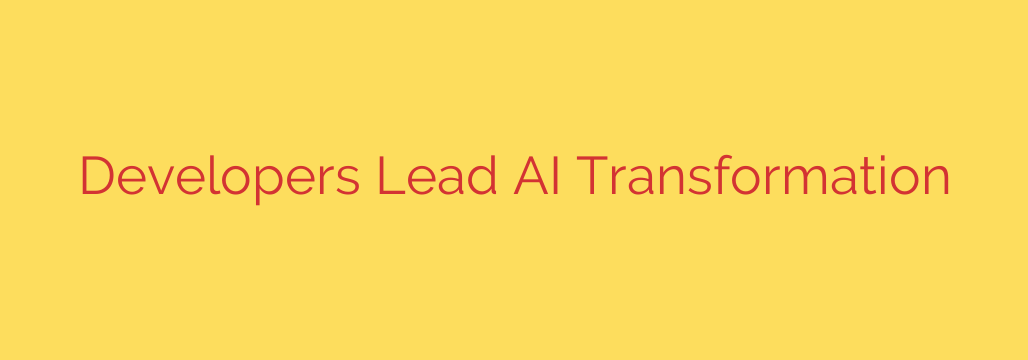
Developers Are Driving the AI Revolution: Here’s What You Need to Know
The conversation around Artificial Intelligence has shifted dramatically. What was once a futuristic concept discussed in boardrooms is now a practical tool being actively implemented across every industry. At the heart of this monumental shift are not just data scientists or AI researchers, but the software developers on the front lines. It’s the developers—the builders, creators, and problem-solvers—who are the true architects of the AI transformation.
They are moving beyond simply using applications with AI features and are now embedding intelligent capabilities directly into the software and systems that power our world. This evolution marks a critical turning point in how technology is created and utilized.
The Shift from AI Hype to Practical Application
For years, AI was more of a buzzword than a tangible asset for many organizations. Today, that has fundamentally changed. The rise of powerful, accessible Large Language Models (LLMs) and sophisticated AI tools has placed immense creative power directly into the hands of developers.
Instead of being a separate, specialized field, AI is becoming an integral part of the modern software development lifecycle (SDLC). From planning and coding to testing and deployment, intelligent automation is augmenting and accelerating every step of the process. This integration is not just making development more efficient; it’s enabling the creation of entirely new kinds of software that were previously unimaginable.
How AI is Supercharging Developer Productivity
One of the most immediate impacts of AI is its ability to enhance developer productivity and efficiency. AI-powered coding assistants have become indispensable tools, acting as a “pair programmer” that helps write, debug, and optimize code.
These tools offer significant benefits, including:
- Faster Code Generation: AI assistants can instantly generate boilerplate code, complete complex functions, and suggest entire blocks of logic based on natural language prompts. This frees developers to focus on higher-level architecture and problem-solving.
- Improved Code Quality: By analyzing vast amounts of existing code, AI can suggest best practices, identify potential bugs, and help developers write cleaner, more maintainable code from the start.
- Accelerated Learning and Onboarding: For developers learning a new language or framework, AI tools serve as an interactive mentor, providing instant examples and explanations that can dramatically shorten the learning curve.
Beyond Productivity: Building the Next Generation of Applications
While efficiency gains are significant, the true revolution lies in what developers can now build. Developers are no longer just consumers of AI; they are embedding it as a core feature of their applications. This is leading to the rise of “AI-native” software that is more intuitive, personalized, and powerful.
We are seeing this in applications that feature intelligent search, personalized user recommendations, predictive analytics, and automated content generation. By leveraging AI APIs and models, a single developer can now build features that would have once required an entire team of specialized researchers.
Navigating the New Landscape: A Critical Look at Security
With great power comes great responsibility. The rapid adoption of AI in development introduces new security challenges that must be addressed proactively. AI-generated code is not inherently secure and can sometimes introduce subtle vulnerabilities or rely on outdated libraries.
This makes robust security practices more critical than ever. Here is a key security tip:
Actionable Advice: Treat all AI-generated code as untrusted, third-party input. It must be subjected to the same rigorous security reviews, static analysis (SAST), and dynamic testing as any code written by a human. Developers must remain the ultimate arbiters of code quality and security, using AI as a powerful assistant, not a replacement for their expertise.
The Future is AI-Native: What This Means for Businesses and Developers
The role of the software developer is evolving. Success in this new era requires a blend of traditional coding skills and a deep understanding of how to effectively leverage AI. Developers who master prompt engineering, understand the limitations of AI models, and prioritize secure coding practices will be in exceptionally high demand.
For businesses, the takeaway is clear: empowering your development teams is the key to unlocking the full potential of AI. This means providing them with the best tools, investing in continuous training, and fostering a culture of experimentation and responsible innovation. The companies that thrive will be those that recognize their developers as the primary drivers of their AI strategy.
In conclusion, the AI revolution is not happening in a vacuum—it’s being coded into existence, one line at a time, by developers around the world. They are not just participating in the change; they are wielding it to build the next generation of technology.
Source: https://www.microsoft.com/en-us/microsoft-cloud/blog/2025/10/13/fyai-why-developers-will-lead-ai-transformation-across-the-enterprise/








